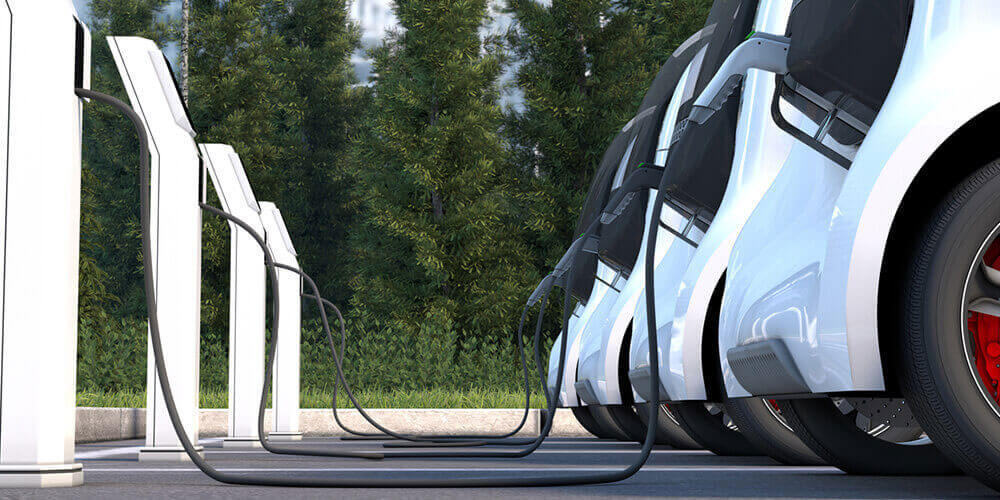From delivery vehicles and taxi cabs to commercial and utility fleets, public and private fleet operators are beginning to phase out their oil-filled vehicles in favor of clean electric vehicles (EV) and smart EV charging solutions. There are several factors contributing to this switch to electric vehicles including:
- EV prices are lowering
- Potential cost-savings over time are growing
- Availability of medium- and heavy-duty EV models are doubling annually
- The number of federal and state tax incentives and local utility rebates for fleet charging stations is increasing
These factors paint a clear picture; fleet operators now have a viable path to implementing cost-effective electric vehicles to support various use cases. The next question is whether they have the charging infrastructure to support their clean electric fleet.
Regardless of the plethora of EV models on the market, fleet electrification is unattainable without charging infrastructure. EV charging stations - the physical network that transfers electricity from the grid to the vehicles themselves - form the backbone of any electric fleet. As more OEMs offer electric fleet options, fleet managers will need to install EV charging stations to accelerate the next step in fleet electrification.
To help decision-makers prepare for fleet electrification, here are a few fleet assessment questions to help gauge your requirements as well as some preliminary guidelines to ensure you partner with the right third-party EV charging service provider.
10 Questions to Help Assess EV Charging Requirements for Fleets
Every EV fleet is unique. Fleets vary in size and comprise varying vehicle models. Due to these differences, there is no “one size fits all” approach to charging plans. Fleet operators should fully understand their charging requirements including the layout of their depot, operational flow, estimated average daily miles, and more. If a company doesn’t consider their unique fleet profile, they increase the risk of partnering with a service provider ill-equipped to handle their charging requirements.
Here are a few questions companies can utilize to better assess their EV charging requirements. The answers to these questions will help potential service providers formulate site design, financial estimates, software needs, charging requirements, and energy management considerations. Make sure to log the answers to these questions to streamline future conversations with potential service providers.
1. Fleet Size - How many vehicles are in your existing fleet and what is the potential number of vehicles in future fleets?
2. Facility Characteristics - What type of facility is it (distribution center, warehouse, commercial building, city hall, etc.), and do you own or lease the property?
3. Vehicle Storage - Do vehicles go home with the driver, return to the depot, or an alternative destination?
4. EV Vehicle Model and Type - What vehicle types (passenger vehicle, delivery van, box truck, etc.) are you considering for electrification, and what are the particular electric vehicle make/models?
5. Vehicle Application - What is the application for the vehicle (service vehicle, delivery truck, etc.), and what is the cargo type (people or goods)?
6. Fleet Mileage - What is your fleet’s estimated average daily miles and how many days per week will vehicles be in-use?
7. Energy Management - Do vehicles leave and return at the same time or are departures and arrivals staggered?
8. Dwell Time - What is the estimated available charging time (dwell time) in hours per day
9. Fleet Policy - Is charging infrastructure dedicated to fleet vehicles or shared use such as employee personal vehicles? For shared charging infrastructure, are there vehicles with different charging priority levels?
10. Operational Efficiency - Is vehicle charging needed during the loading and unloading process?
How to Identify a Qualified EV Fleet Solution Partner
Electrification is occurring rapidly as more financial incentives become available for businesses using EV fleets and workplace EV charging stations. However, planning for EV charging infrastructure is more complicated than most fleet managers think.
Fleet electrification requires strategic planning and the assistance of a third-party charging station provider to ensure a smooth transition from Internal Combustion Engines (ICE) to electric vehicles. From design considerations and hardware recommendations to infrastructure installation and equipment monitoring, a credible EV charging partner provides end-to-end EV charging solutions and lends their expertise to help fleet managers prepare for the road ahead.
Here are three basic capabilities to look for when identifying a potential partner. These basic expectations are meant to help companies find a partner with the knowledge and expertise needed to maximize the significant upfront investment.
1. Help Leverage Incentive Programs - A qualified partner will identify all available incentives, tax credits, grants, and local utility programs to reduce upfront infrastructure costs and long-term operational costs. ANS Advanced Network Services is proud to have extended its services as an approved contractor for the NYS EV Make Ready Program with Joint Utilities of New York. Through the EV Make-Ready Program, companies seeking to install EV charging stations can earn incentives that will offset a large portion, or in some cases all, of the infrastructure costs.
2. Assist in Equipment Selection - An experienced partner will provide recommendations for the best infrastructure, Electric Vehicle Supply Equipment (EVSE), and formats based on your unique fleet profile. Recommendations are made with the foresight to accommodate fleet growth and adapt to future technological innovations.
3. Aid the Implementation of Management Software - A proficient partner will install intelligent monitoring and maintenance software to track important metrics such as energy consumption and charging station status to maximize fleet productivity and uptime.
The right third-party EV solution provider simplifies EV fleet transitions and is intimately familiar with fleet profiles, ensuring the implementation of a charging strategy that best fits unique requirements. They accurately assess how many charging stations are needed, what type, and where they should go, ensuring fleet operators have the information and technology required for successful fleet management. They forge strong relationships with major electric charger manufacturers to offer flexible, reliable, and upgradable hardware including DFC and Level 2 EV Chargers. The best EV charging partners establish an ongoing relationship and install powerful remote monitoring software to ensure every charging station is maintained and fully operational.
Prepare Your Fleet for Electrification
The EV revolution is already underway. Decision-makers interested in fleet electrification can’t install a few EV charging stations and hope for the best. Forward-thinking companies should partner with experienced EV fleet specialists to simplify and streamline the electrification process. A qualified EV charging partner will create customized charging strategies based on specific fleet needs to maximize the return on upfront investments and ensure successful deployment.






